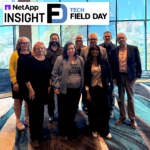|
|
 Jeff Baxter presented for NetApp at Tech Field Day Experience at NetApp INSIGHT 2025 |
This Presentation date is October 16, 2025 at 8:00-8:45.
Presenters: Jeff Baxter, Syam Nair
Jeff Baxter and Syam Nair introduce NetApp’s AI vision and new product strategy at INSIGHT 2025.
Enterprise Grade Artificial Intelligence with NetApp
Watch on YouTube
Watch on Vimeo
In this presentation, Jeff Baxter, VP of Product Marketing at NetApp, discusses how NetApp is enabling enterprise-grade artificial intelligence through a comprehensive intelligent data infrastructure. By addressing four key imperatives—modernizing data centers, transitioning to the cloud, adopting AI, and ensuring cyber resilience—NetApp aims to help organizations transform how they manage and utilize data.
Baxter underscored NetApp’s singular focus on data infrastructure, highlighting the evolution of the ONTAP operating system as a consistent data plane across environments—from on-premises systems to public and sovereign clouds. A major topic was the unveiling of the NetApp data platform and the importance of AI-ready data. Baxter asserted that many AI projects fail, not due to flawed models or lack of talent, but because the data isn’t prepared for AI—emphasizing issues like accessibility, compliance, and integration. With this challenge in mind, NetApp is repositioning itself as a true data platform company, absorbing years of enterprise experience into a unified, resilient, and highly available backbone for modern workloads.
Baxter then introduced two significant product announcements: the NetApp AFX system and the NetApp AI Data Engine, together named the NetApp AFX AI portfolio. AFX is a disaggregated storage architecture built on enhanced ONTAP, allowing for scalable performance and storage capacity separately—ideal for diverse AI workloads. The AI Data Engine complements this by providing a high-speed, secure data pipeline integrated with a vector database optimized for AI use cases like retrieval-augmented generation (RAG). This engine supports semantic search, data guardrails, and AI-ready APIs, pushing AI workloads into full enterprise territory with the reliability, compliance, and availability expectations that business-critical systems require.
Personnel: Jeff Baxter
Redefining Data Infrastructure for AI with NetApp
Watch on YouTube
Watch on Vimeo
At the Tech Field Day Experience during NetApp INSIGHT 2025, Syam Nair, Chief Product Officer at NetApp, outlines their strategy to redefine data infrastructure for artificial intelligence (AI). The focus is on building intelligent storage systems that unify data across block, file, and object formats, enabling fast and secure access to AI-ready data. By integrating AI capabilities directly into the storage layer, such as metadata enrichment, tokenization, and data governance, NetApp aims to empower storage administrators and extend the usability of data for AI workflows without sacrificing control or security.
In his presentation, Syam Nair emphasized that the AI data landscape is shifting from hype to practical application, with growing unstructured data sources such as machine-generated and generative AI outputs. With the ONTAP platform at its core, NetApp’s vision hinges on making all data AI-ready by embedding intelligence—like security policies, tokenization, and embedding mechanisms—into the data layer itself. This not only ensures data accessibility and governance but also removes the need for complex extraction, transformation, and loading (ETL) processes. NetApp’s AI Data Engine (AIDE) and AFX are designed to streamline this intelligent access while reducing the proliferation of data copies by managing metadata and vectorization in place.
NetApp’s approach aims to elevate the role of storage administrators, transforming them from infrastructure caretakers into enablers of data-centric applications and AI workflows. Instead of pushing AI users to understand the storage backend, NetApp provides APIs and policy-driven data access mechanisms that integrate with tools like Kafka or database systems. Emphasis was placed on security through granular, zero-trust policies and governance over metadata to prevent overhead and sprawl. NetApp aims to support emerging standards such as Apache Iceberg for semantic access and to evolve toward a system where unstructured data can be consumed like structured data—offering semantic reads without altering write formats. Ultimately, NetApp is not attempting to replace databases but rather to unify and enrich data access directly within the intelligent storage infrastructure.
Personnel: Syam Nair








